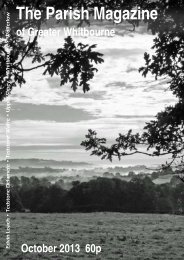Click - Parish of Greater Whitbourne
Click - Parish of Greater Whitbourne
Click - Parish of Greater Whitbourne
You also want an ePaper? Increase the reach of your titles
YUMPU automatically turns print PDFs into web optimized ePapers that Google loves.
Page 14Agricultural Chaplain’s ReportThe <strong>Parish</strong> MagazineTB updateFarms living with TB may benefitfrom more relaxed movementrules. Instead <strong>of</strong> cattle beingbought into restricted herdsrequiring individual licences,farmers will be able to apply fora general licence which willremain in place for the duration<strong>of</strong> the TB restriction unless thedisease status <strong>of</strong> the herddeclines or the herd misses a TBtest deadline. Farmers will alsobe able to move cattle fromlonger distances betweenrestricted premises which willhelp them to source cattle fortheir herds. However the newlicenses will be subject to veterinaryrisk assessments and willonly apply in low risk situations.The Government plans to spend£10m on a TB vaccine for badgerscoupled with a five year programme,staring in June 2010, <strong>of</strong>trapping and injecting badgersacross six areas, each coveringup to 100sq km (25,000 acres) inthe south west and westernEngland. Farmers will be asked toallow contractors onto their landso that badgers can be trapped,marked and vaccinated and theaim is to trap about 70% <strong>of</strong> badgersin each area. However theBritish Veterinary Association(BVA) and the British CattleVeterinary Association haveissued a joint statement advocatingthe case for humane, targetedand managed culling <strong>of</strong> badgersin specific areas where they areregarded as significant contributorsto the persistent presence <strong>of</strong>TB. The BVA suggests that thecurrent government strategy forTB control is inadequate.“Green” issuesA Defra funded study entitledComparative Life CycleAssessment <strong>of</strong> FoodCommodities has looked at thegreen credentials <strong>of</strong> home-growncompared to imported food. Bycomparing factors such as energyuse, global warming potential,pesticides and land use for sevendifferent foods it concludes thatsome imported produce may bemore environmentally friendlythan the equivalent home grownvariety. Thus Spanish tomatoesmay be better environmentallybecause the energy required toheat greenhouses in the UK isgreater than the energy used intransporting the Spanish produce.The study, which is certainto generate further debate, waspublished on the Defra website.A study commissioned by theFood Standards Agency suggeststhat there is no intrinsic healthor nutritional benefits fromorganic, compared to conventionallyproduced, food thoughthe Soil Association has questionedthe methodology used.The Soil Association has alsobeen critical <strong>of</strong> environmentalistswho state that cutting redmeat consumption will combatclimate change as “too simplistic.”Farming livestock as part <strong>of</strong>a mixed farming system isimportant to help combat climatechange because long termpastureland helps to trap carbon.Dairy sector updateA report from the EUCommission on the diary sectorhas criticised supermarkets forfailing to pass on the fall in dairycommodity prices to their customers.The Commission’s figuresshow that since the end <strong>of</strong>2007 wholesale butter prices fellby 39%, skimmed milk powder by49%, cheese by 18% and milk by31% yet the price paid by consumersfell by only 2%. TheCommission has called forgreater market transparency andfairer market distribution and isaddressing anti-competitivepractices within the sector.The Commission also predictsfurther difficulties for the dairyThe Rev Nick Read, AgriculturalChaplain, Diocese <strong>of</strong> Herefordsector with prices falling evenlower in 2010. A research consultancypredicts an 8% reductionwhilst the OECD predicts a fall <strong>of</strong>2%. However in the longer termdairy values are expected torecover. Milk prices for the UKfor May 2009 averaged22.5p/litre, 8% less than thesame period in 2008 and 18%less than the peak monthly pricein October 2008. Prices in Franceare 18% lower than twelvemonths ago, Germany 24% andIreland 30%.Sheep tagging updateThe Commission has agreed to amajor concession which willreduce the costs involved withthe Electronic Identification (EID)<strong>of</strong> sheep. The concessions meanthat the animals’ electronic tagswill be scanned at “critical controlpoints”, such as markets orabattoirs, rather than on farmswhich means that farmers willnot need to buy their own tagreaders, with an estimated savingto the industry <strong>of</strong> up to £18m ayear. However farming organisationsare disappointed that inreturn for these concessionsDefra has agreed not to pursueany further substantive issueswith the Commission relating tosheep EID.Best wishesNick Read
















